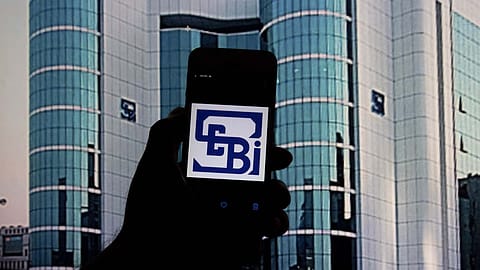Dark fibre case: SEBI imposes ₹43.8 cr penalty on NSE, Chitra Ramkrishna, others
NSE has been fined ₹7 crore, its former MD & CEO Chitra Ramkrishna, former group chief operating officer Anand Subramanian have been asked to pay ₹5 crore each.

The Securities and Exchange Board of India (SEBI) on Wednesday imposed monetary penalties on the National Stock Exchange (NSE), its former managing director and chief executive Chitra Ramkrishna and her key aide Anand Subramanian.
The market regulator, in its 186-page order, found Ramkrishna, Subramanian and India's largest stock exchange guilty of collusion in the 2015 dark-fibre case.
While NSE has been fined ₹7 crore, its former MD & CEO Chitra Ramkrishna, former group chief operating officer Anand Subramanian and current chief business development officer Ravi Varanasi have been asked to pay ₹5 crore each.
SEBI has imposed a cumulative penalty of ₹43.8 crore on the 18 entities. This includes a ₹3 crore fine on internet service provider Sampark Infotainment. Broking firms Way2Wealth Brokers and GKN Securities have to pay a penalty of ₹6 crore and ₹5 crore, respectively.
The order comes after the market watchdog received a complaint in 2015, alleging irregularities in some brokers getting point-to-point (P2P) dark fibre connectivity from Sampark Infotainment, the service provider for NSE's co-location servers.
Brokerage firms Way2Wealth and GKN Securities benefitted from preferential access to the NSE facility in collusion with the stock exchange and its employees, the order says.
"Chitra being the MD & CEO of NSE cannot escape from the responsibilities of any fraudulent action or lack of action or any activities committed by the subordinate officers which lacks integrity and due diligence on their part," says SEBI adjudicating officer Suresh B Menon.
Recommended Stories
"The pleas taken by Chitra in this regard, such as: she is not aware of such activities or actions, that the subordinates have not escalated the matter to her, that she has appointed competent people to perform their specialized functions hence her job as far as discharge of function of such specialized divisions is discharged, etc. is absurd and cannot be accepted," Menon adds.
According to SEBI, one of the options for undertaking P2P connectivity was to use "dark fibre" – unutilised fibreoptic cables which are not connected to active electronics, equipment and do not have other data flowing through them.
"GKN established direct P2P connectivity between its racks located in NSE Colo & BSE Colo center with the help of dark fibre or near dark fibre provided by an unauthorized service provider which assured more speed and low latency thereby assuring faster data transmission and assuring GKN of faster access to the market data disseminated by NSE in comparison to the other high frequency trading brokers located in the Colo facility of these two exchanges," the regulator says in its latest order.
NSE did not conduct a site inspection of GKN indicating favourable treatment by NSE which shows the collusive nexus between NSE and GKN in the matter of P2P connectivity to the detriment of several other rule abiding stock brokers, the order says.
(INR CR)
This early view of market data certainly benefited GKN in executing its high frequency trade in a more efficient manner thereby depriving the same facility to the other co-located brokers who, in good faith and in compliance with the NSE guidelines did not take dark fibre services from any unauthorised vendors and instead, stuck to their regular telecom service providers, SEBI adds.